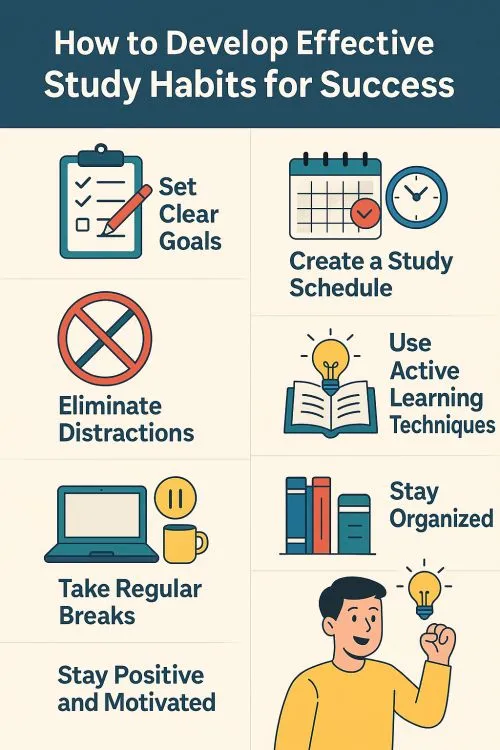
How to Develop Effective Study Habits for Success
Studying effectively is a key to academic success, whether you're a student, a professional learning new skills, or someone looking to improve in a particular area. Establishing good study habits doesn’t just help you absorb information; it also sets you up for long-term success. Here are some proven strategies to help you study more efficiently and effectively:
1. Set Clear Goals
Before you even open a textbook or start researching, set specific goals for each study session. These goals should be measurable and achievable. For example:
Instead of saying "I need to study math," set a goal like, "I want to finish chapter 3 and solve 10 practice problems."
Break larger tasks into smaller steps to keep yourself focused and motivated.
2. Create a Study Schedule
Time management is one of the most important skills you can develop. A study schedule helps you balance your academic work with other commitments. Plan your day and week in advance by allocating specific time blocks for studying.
Use a calendar or planner to set aside dedicated study times, ensuring that you don’t procrastinate.
Consistency is key, so try to study at the same time each day to build a routine.
3. Eliminate Distractions
Distractions can significantly hinder your ability to focus. To avoid wasting time, try the following:
Choose a quiet, comfortable study environment free of distractions like your phone, TV, or social media.
If you need to have your phone nearby, consider using apps that block distracting sites or put your phone in "Do Not Disturb" mode.
4. Use Active Learning Techniques
Simply reading through your notes or textbooks may not be enough. Engage actively with the material by:
Summarizing what you’ve learned in your own words.
Asking yourself questions about the material.
Using flashcards or quizzes to test your knowledge.
Teaching the material to someone else, which is one of the best ways to reinforce what you’ve learned.
5. Take Regular Breaks
Don’t make the mistake of thinking you have to study for hours on end without a break. Our brains need time to process information, so take regular, short breaks during your study sessions.
The Pomodoro Technique is a great method: study for 25 minutes, then take a 5-minute break.
Use your breaks to get up, stretch, hydrate, or take a walk to refresh your mind.
6. Stay Organized
Staying organized will help you manage your workload and reduce stress. Here’s how to keep things in order:
Keep your study materials (notes, books, etc.) organized by topic or subject.
Use digital tools like note-taking apps or cloud storage to keep everything accessible and neatly categorized.
Review and update your study schedule as needed to stay on track.
7. Stay Positive and Motivated
Learning can sometimes feel like an uphill battle, especially when you're juggling multiple subjects or topics. It’s important to stay motivated and keep a positive mindset. To do this:
Celebrate small wins. Completing a chapter or mastering a difficult topic is an accomplishment.
Stay positive by focusing on your progress rather than stressing over setbacks.
Remind yourself of your long-term goals and why you’re working hard in the first place.
Final Thoughts
Effective study habits don’t happen overnight, but with dedication and consistency, you’ll develop the skills needed to succeed. Whether you’re preparing for exams, learning new software, or mastering a language, these habits will help you study smarter, not harder.
Start implementing these strategies today and watch how your study sessions become more efficient, productive, and enjoyable!
